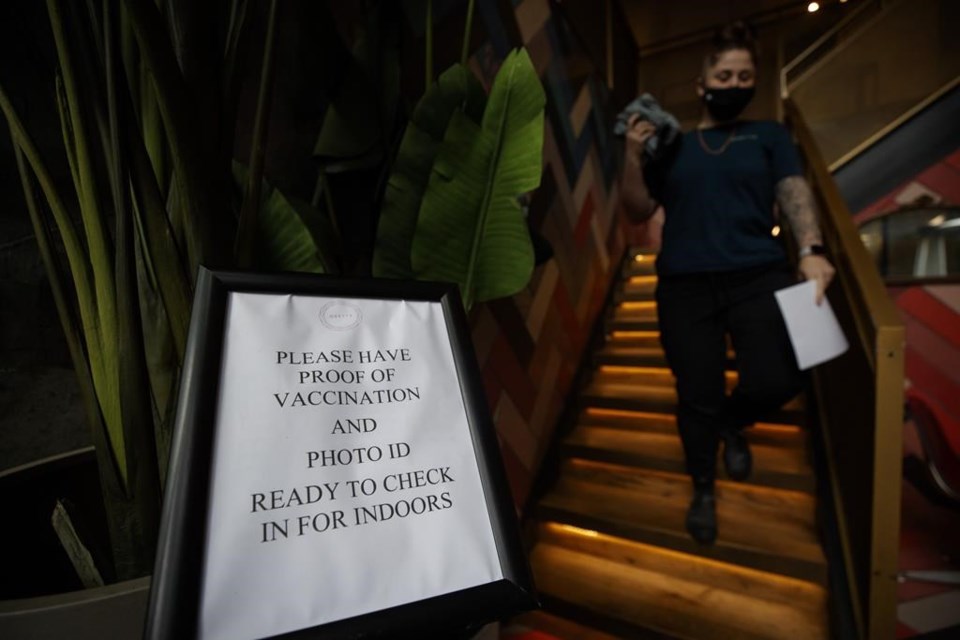TORONTO — When it comes to teens eating out with friends or catching a movie at the local cinema, identification cards are not typically staple items in their backpacks or wallets.
But under Ontario’s COVID-19 vaccine certificate system, all youth under 18 are required to carry proof of vaccination as well as a form of ID to access certain settings – and business groups say that's made enforcement more challenging.
Passports, birth certificates, citizenship cards, drivers' licences and health cards are among the accepted forms of identification.
A spokeswoman for the health minister said youth under 18 can show a photocopy or digital version of an identification document along with their proof of vaccination to enter affected businesses like restaurants and gyms.
"Photocopies of ID and digital versions (stored in phone) are generally not acceptable, but allowed for youth," Alexandra Hilkene said.
A spokesman for Restaurants Canada told The Canadian Press on Tuesday that his group wasn't aware of that exception.
"It hasn't been communicated to us in any way," James Rilett, vice president of the group, said in an interview.
Rilett said the identification piece of Ontario's policy has been challenging when it comes to young customers because many don't carry passports and birth certificates around on a daily basis.
That has left restaurant staff to make on-the-spot decisions about whether to accept vaccination proof without identification, Rilett said, arguing that puts workers in a "precarious position" between customers and provincial rules.
In some cases, Rilett said staff can take an attestation from a companion about the young customer's identity, but he noted that businesses are wary of making exceptions.
"A lot of places are nervous that they'll get cited by public health officials," he said. "Many are exercising discretion but they really don't, according to the law, have that discretion."
He said information about the policy has come out in stages, and argued that busy operators lack the time and resources to pore over legal documents and guidelines to find answers to their questions.
"If the government could provide some very easy-to-read, easy-to-understand guidelines and instructions to restaurants, that would be very helpful," Rilett said.
The Canadian Federation Of Independent Business raised similar concerns.
Julie Kwiecinski, Ontario provincial affairs director for the group, said it's been flagged as an issue that young people don't often carry identification.
She said parents may be nervous about letting their children carry around their birth certificate or passport if they don't have another form of ID. She also noted guidance about the photocopy option for youth is not easily accessible and many parents and business owners aren't aware of it.
On top of that, she said some businesses appear confused about whether the policy applies to young people at all .
"We're not confident that business owners are aware that the vaccine credentials policy applies to people under 18," she said in an interview Tuesday, noting that some businesses have reached out to ask about it.
"Of course we told them yes," she said. "If there's a few that ask, generally there's a lot more."
Kwiecinski said businesses need more clarity on the rules.
"There's no such thing as over communication on this," she said.
Sanaa Kohlman Sawa, a 16-year-old who works at a restaurant in Toronto, said she's had to check patrons' IDs when enforcing the policy at work. She said she'd need to plan ahead if she was going out with friends in order to remember to take ID with her.
"I don't usually have ID on me," she said in an interview. "If I had plans to go out I'd probably plan to have my passport on me."
A 20-page guidance document from the province on proof of vaccination addresses the issue of youth aged 12 to 17 who "may not have identification to verify their identity," saying ID requirements are "flexible" for the cohort and only a person's name and date of birth need to be confirmed.
"Government identification can be used for this purpose; however, is not the only type of ID accepted," it reads.
"Proof of identity can be established using documentation issued by an institution or public body, provided it includes the name of the holder and date of birth."
The province's vaccine certificate system took effect on Sept. 22.
This report by The Canadian Press was first published Oct. 5, 2021.
Holly McKenzie-Sutter, The Canadian Press

